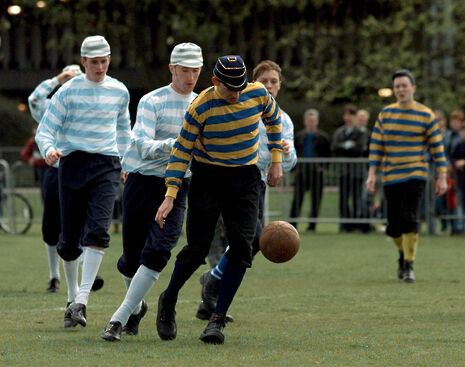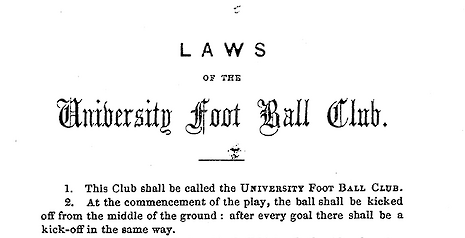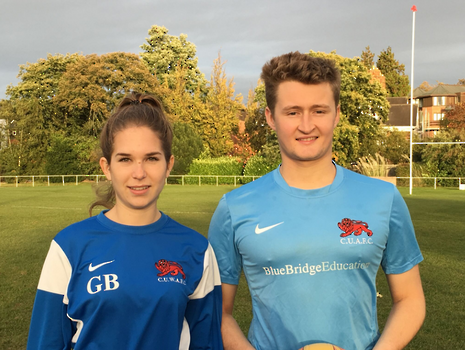University football club to receive Hall of Fame induction
CUAFC’s award is a recognition from the National Football Museum of the club’s contribution to the history and the development of the sport

Cambridge University Association Football Club (CUAFC) is set to be inducted into the prestigious Hall of Fame at the National Football Museum tonight, an honour bestowed on the 160-year-old club in recognition of its contribution to the history of the beautiful game and its place as “the oldest club in the world”.
CUAFC will be housed alongside a list of notable footballing personalities, including Gordon Banks, Alan Shearer and Gary Neville. Indeed, also enjoying tonight's ceremony will be England defenders Rio Ferdinand and Rachel Unitt, and goalkeepers David Seaman and Rachel Brown-Finnis, who are also receiving similar inductions.
The immortalisation of CUAFC in the Hall of Fame is testament to the club's impact on the game: historian Colin Weir has asserted in his book on the club that "it would be hard to exaggerate the influence that the University footballers of Cambridge have had on the game in England and subsequently all over the world".
Indeed, the reported foundation of CUAFC in 1846 by Henry de Winton and John Charles Thring – who went about formalising what had previously been a somewhat ad hoc mix of students from Trinity College and Jesus College – is almost universally described as the birth of the rules of modern football. In 1848, they are said to have held a meeting in Cambridge, aimed at creating a definitive set of rules for the game of football.
Their simple 10-part code – which they pinned up on trees along Parker’s Piece and which contained the first ever articulation of the off-side rule – became known as the 'Cambridge rules', and helped transform football from something fairly unrecognisable as a sport (in the sense that games lacked structure and often ended in violence and brawling) to the modern world-famous sport seen today.
Indeed, as Dr John Little, President of CUAFC told the University website, "Before the code was produced things were quite chaotic. Players would have to read whatever set of rules had been posted on a tree near to where the game was to be played and decide if they were rules they were familiar with before they played. In Cambridge, it was decided it would be better if one set of rules was agreed on so that everyone could play against each other.”

With its links said to go back to 1846, the oldest existing document which names the club and the rules dates back to 1856. So CUAFC can claim to be, unofficially at least, the oldest club in the world which is still playing. Though Sheffield FC (founded 1857), is recognised as the oldest club by the Football Association, CUAFC was awarded an illuminated plaque in 2006 by the FA in honour of its 150th anniversary, giving its foundation date official recognition.
Former players from CUAFC were also responsible for setting up many of the early football clubs, such as Hallam FC in Sheffield and the Forest Club in Essex.
Alongside playing a major role in the formulation of the sport's original rulebook, CUAFC have been long credited with revolutionising the playing of the sport. In his book on the first 100 years of football, Adrian Harvey concludes that "the side that was generally credited with transforming the tactics of association football and almost single-handedly inventing the modern game was not a professional team but the Cambridge University XI of 1882. Contemporaries described Cambridge as being the first 'combination' team in which each player was allotted an area of the field and played as part of a team in a game that was based upon passing."
The 1883 side has been credited as the first team to introduce the 'pyramid' 2-3-5 formation (two defenders, three midfield, and five strikers), which soon became the norm for all football teams. As C.W. Alcock reportedly observed in 1891 "the [CUAFC] eleven of 1882 were the first to illustrate the full possibilities of a systematic combination giving full scope to the defence as well as the attack".
And the creation of the Varsity football match between CUAFC and their Oxford University rivals has left its mark on the sport. Played at Wembley between 1953 and 1989, the fixture is one of the oldest in world football, having been played every year since 1873 (with breaks for the two World Wars). The first ever game between the sides ended in a 1-0 victory for Oxford, with England international Robert Vidal scoring the only goal.
And since the early years, CUAFC has continued to leave its mark on the footballing world. Over 50 CUAFC players have gone on to earn caps for England, and the club continues to hold a seat on the FA Council. It has also had an impact on the international stage: the club's first overseas tour took place in Hungary in 1902, and as recently as this summer, CUAFC's men's team took part in the World Elite University Football Tournament (WEUFT) in China.
The reaction to the news of CUAFC's award has been universally positive. Nick Brooking, Director of Sport at the University, told the University website: "Sport plays a major part in the amazing student experience at Cambridge and this award shows how far back our involvement and passion for football goes. This is a great honour and it is right that the University football club’s pivotal role in the history of the beautiful game should be recognised in this way.”

Meanwhile, current captain of CUAFC's women's team Gerda Bachrati, a veterinary medicine student at Gonville & Caius College, said: “Football has always been a family affair. I started playing when I was seven. When my sister started playing my father began coaching. I have a whole social network built out of it. When I came to Cambridge I wanted to keep that going – it can be quite lonely studying. I think to thrive at Cambridge you need a demanding activity to balance out the demanding academic life. It has made me more organised with my time and given me the chance to be a team leader long before I am expected to do it in my career. The award and recognition – for the Club and University – is amazing, adding to an exciting time for women’s sport at Cambridge"
And the current CUAFC's men’s captain, Henry Warne, a Politics student at Fitzwilliam College, explained that: "Football has been in my family my whole life. It is the main reason I came here – I went to a comprehensive so coming to Cambridge wasn’t something expected. But my uncle always said how getting a rugby Blue when he was here and that it had been a great thing in his life. Since I was 15 I have wanted to get a football Blue. I have loved Cambridge as a sporting and an academic opportunity."
He added: "To be captain when this is happening is special. I feel very lucky to be part of a club with such a long history and pivotal role and it is wonderful to have the external recognition of this great club.”
Both captains agreed that playing sports as a student has enriched their lives at Cambridge. "The sacrifice for football is great but sport in study helps not hinders. It motivates me to work hard,” said Warne, adding that around half of the squad last year got Firsts in their studies.
The National Museum of Football's Hall of Fame is nationally recognised, with new legends being inducted in a prestigious awards ceremony every year. The museum, located in Manchester, was first established and its collection acquired thanks to a £9.3 million investment by the Heritage Lottery Fund, and it is now a registered charity overseen by a board of trustees, with many notable names among its honorary positions, including Museum President Sir Bobby Charlton, Museum Vice-Presidents Sir Alex Ferguson, Sir Trevor Brooking and Sir Geoff Hurst, plus Museum Special Ambassador Mark Lawrenson
 News / Caius mourns its tree-mendous loss23 December 2025
News / Caius mourns its tree-mendous loss23 December 2025 News / Cambridge welcomes UK rejoining the Erasmus scheme20 December 2025
News / Cambridge welcomes UK rejoining the Erasmus scheme20 December 2025 News / CUP announces funding scheme for under-represented academics19 December 2025
News / CUP announces funding scheme for under-represented academics19 December 2025 News / King appoints Peterhouse chaplain to Westminster Abbey22 December 2025
News / King appoints Peterhouse chaplain to Westminster Abbey22 December 2025 Interviews / Politics, your own way: Tilly Middlehurst on speaking out21 December 2025
Interviews / Politics, your own way: Tilly Middlehurst on speaking out21 December 2025








